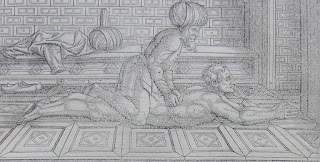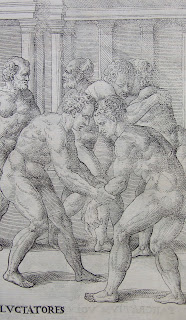Origins of Sports and Exercise Medicine
This is the first in a series of posts based on the displays at RCPI's open day in August, Doctors on the Ball: Sports and Medicine in Ireland
Although sports medicine has only become a recognised specialty in medicine during the twentieth century, medics from the earliest times have recognised the links between sports and medicine. This post will look at some of the physicians in the ancient and medieval world who saw exercise not only as a cause of injury, but also as an important tool for doctors to use in keeping their patients healthy, and for curing illnesses.

Claudius Galenus, better known simply as Galen, was one of the most accomplished medics of the ancient world. Born in Pergamon (modern day Turkey) in 129 to a wealthy family, he travelled widely across the Roman Empire studying medicine. In 157, at the age of 28, Galen returned to Pergamon where he took up a position as physician to the Gladiators of the High Priest of Asia, one of the wealthiest and most influential men in Asia. Galen's four years in this position gave him an unparalleled exposure to anatomy and surgery, and also showed the importance of clinical observation in curing aliments of all kinds. He referred to the wounds of the gladiators he treated as "windows into the body". The need to keep the gladiators healthy, as well as treating their injuries, also showed Galen the importance of diet, hygiene, preventative medicine and fitness.
Abū Άlī al-Husayn ibn Άbd Allāh ibn Sīnā, more commonly known in the West by his Latinized name Avicenna, was a Persian polymath and a leading figure in the Islamic Golden age of the medieval period. Born around 980 in Bukhara (modern day Uzbekistan), he started studying medicine aged 16, and was a qualified physician by the age of 18. Avicenna produced a huge number of treatises on subjects including medicine, philosophy, astronomy, chemistry and poetry. His best known medical work,
The Canon of Medicine, draws on the works of Galen and Hippocrates. Once translated into Latin it became a standard textbook of medical students in Europe into the seventeenth century.
 |
| Image of physiotherapy from Avicenna's Canon |
The first volume of The Canon contains Avicenna's views on the importance of medicine. He states that the three essentials for maintaining health are exercise, food and sleep. Avicenna details the value of exercise as '(1) it hardens the organs and renders them fit for their functions (2) it results in a better absorption of food, aids assimilation … improves nutrition (3) it clears the pores of the skin (4) it removes effete substances through the lungs (5) it strengthens the physique. Vigorous exercise invigorates the muscular and nervous system'. He goes on to classify and discuss different types and modes of exercise, and to recommend different exercises for different types of individuals and different illnesses. He also considers the importance of diet and the type and quantity of food which should be consumed.
Girolamo Mercuriale, also known by his Latin name Hieronymus Mercurialis, was born in Forlì in Italy in 1530. The son of a doctor, Mercuriale studied medicine at Bologna, Padua and Venice, where he received his degree in 1555.
Mercuriale settled in Rome where he studied the classical medical literature of Ancient Greece and Rome. In 1569 he published De Arte Gymnastica which is considered to be one of the first works on sports medicine. De Arte Gymnastica starts with an overview of exercise and athletics in ancient times, but also deals with the medical aspects of physical exercise. He contests the idea that a healthy person does not need exercise, quoting classical authors who advise moderate exercise for all. As well as promoting exercise as a natural cure for diseases, he also provides advice on healthy diets and the importance of hygiene.
 |
| Illustration from De Arte Gymnastica |
Both works mentioned in this post form part of Dun's Library and can be consulted in the Heritage Centre reading room. Contact heritagecentre@rcpi.ie to make an appointment.